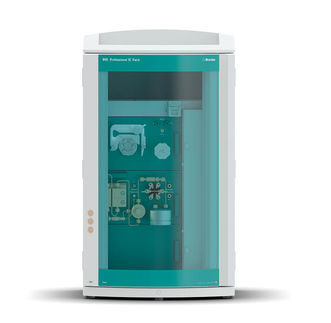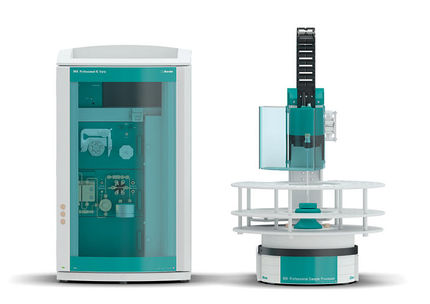Short-chain acyl-coenzyme A dehydrogenase deficiency
Short-chain acyl-coenzyme A dehydrogenase deficiency
Classification & external resources
| ICD-9
| 277.85
|
| OMIM
| 201470
|
| DiseasesDB
| 31599
|
Short-chain acyl-coenzyme A dehydrogenase deficiency (or "SCADD") is a fatty acid oxidation disorder which affects enzymes required to break down a certain group of fats called short-chain fatty acids.
Diagnosis
Some affected infants will exhibit vomiting, low blood sugar (hypoglycemia), a lack of energy (lethargy), poor feeding, and failure to gain weight and grow at the expected rate (failure to thrive). Other features of this disorder may include poor muscle tone (hypotonia), seizures, developmental delays, and a small head size (microcephaly). The symptoms of short-chain acyl-CoA dehydrogenase deficiency may be triggered by periods of fasting or during illnesses such as viral infections. In some cases, signs and symptoms may not appear until adulthood, when some individuals may develop muscle weakness and wasting. Other people with gene mutations that can cause this disorder may have such mild symptoms that they are never diagnosed. Many biochemical geneticists consider this to be a biochemical phenotype with a very mild clinical phenotype or no clinical phenotype.
Genetics
Mutations in the ACADS gene cause short-chain acyl-coenzyme A dehydrogenase deficiency. Mutations in the ACADS gene lead to inadequate levels of an enzyme called short-chain acyl-CoA dehydrogenase. This enzyme is important for the breakdown of short-chain fatty acids. Reduced levels of this enzyme prevent short-chain fatty acids from being further broken down and processed in the mitochondria (the energy-producing centers inside cells). As a result, these short-chain fatty acids are not converted into energy, which can lead to the signs and symptoms of this disorder, such as lethargy and hypoglycemia.
This condition is an autosomal recessive disorder, which means two copies of the faulty gene must be inherited to be afflicted with the disorder. Most often, the parents of an individual with an autosomal recessive disorder are carriers of one copy of the altered gene, but do not have the disorder. This disorder is thought to affect approximately 1 in 40,000 to 100,000 newborns.
| Metabolic pathology / Inborn error of metabolism (E70-90, 270-279) |
|---|
| Amino acid | Aromatic (Phenylketonuria, Alkaptonuria, Ochronosis, Tyrosinemia, Albinism, Histidinemia) - Organic acidemias (Maple syrup urine disease, Propionic acidemia, Methylmalonic acidemia, Isovaleric acidemia, 3-Methylcrotonyl-CoA carboxylase deficiency) - Transport (Cystinuria, Cystinosis, Hartnup disease, Fanconi syndrome, Oculocerebrorenal syndrome) - Sulfur (Homocystinuria, Cystathioninuria) - Urea cycle disorder (N-Acetylglutamate synthase deficiency, Carbamoyl phosphate synthetase I deficiency, Ornithine transcarbamylase deficiency, Citrullinemia, Argininosuccinic aciduria, Hyperammonemia) - Glutaric acidemia type 1 - Hyperprolinemia - Sarcosinemia |
|---|
| Carbohydrate | Lactose intolerance - Glycogen storage disease (type I, type II, type III, type IV, type V, type VI, type VII) - fructose metabolism (Fructose intolerance, Fructose bisphosphatase deficiency, Essential fructosuria) - galactose metabolism (Galactosemia, Galactose-1-phosphate uridylyltransferase galactosemia, Galactokinase deficiency) - other intestinal carbohydrate absorption (Glucose-galactose malabsorption, Sucrose intolerance) - pyruvate metabolism and gluconeogenesis (PCD, PDHA) -
Pentosuria - Renal glycosuria |
|---|
| Lipid storage | Sphingolipidoses/Gangliosidoses: GM2 gangliosidoses (Sandhoff disease, Tay-Sachs disease) - GM1 gangliosidoses - Mucolipidosis type IV - Gaucher's disease - Niemann-Pick disease - Farber disease - Fabry's disease - Metachromatic leukodystrophy - Krabbe disease
Neuronal ceroid lipofuscinosis (Batten disease) - Cerebrotendineous xanthomatosis - Cholesteryl ester storage disease (Wolman disease) |
|---|
| Fatty acid metabolism | Lipoprotein/lipidemias: Hyperlipidemia - Hypercholesterolemia - Familial hypercholesterolemia - Xanthoma - Combined hyperlipidemia - Lecithin cholesterol acyltransferase deficiency - Tangier disease - Abetalipoproteinemia
Fatty acid: Adrenoleukodystrophy - Acyl-coA dehydrogenase (Short-chain, Medium-chain, Long-chain 3-hydroxy, Very long-chain) - Carnitine (Primary, I, II) |
|---|
| Mineral | Cu Wilson's disease/Menkes disease - Fe Haemochromatosis - Zn Acrodermatitis enteropathica - PO43− Hypophosphatemia/Hypophosphatasia - Mg2+ Hypermagnesemia/Hypomagnesemia - Ca2+ Hypercalcaemia/Hypocalcaemia/Disorders of calcium metabolism |
|---|
Fluid, electrolyte
and acid-base balance | Electrolyte disturbance - Na+ Hypernatremia/Hyponatremia - Acidosis (Metabolic, Respiratory, Lactic) - Alkalosis (Metabolic, Respiratory) - Mixed disorder of acid-base balance - H2O Dehydration/Hypervolemia - K+ Hypokalemia/Hyperkalemia - Cl− Hyperchloremia/Hypochloremia |
|---|
| Purine and pyrimidine | Hyperuricemia - Lesch-Nyhan syndrome - Xanthinuria |
|---|
| Porphyrin | Acute intermittent, Gunther's, Cutanea tarda, Erythropoietic, Hepatoerythropoietic, Hereditary copro-, Variegate |
|---|
| Bilirubin | Unconjugated (Lucey-Driscoll syndrome, Gilbert's syndrome, Crigler-Najjar syndrome) - Conjugated (Dubin-Johnson syndrome, Rotor syndrome) |
|---|
| Glycosaminoglycan | Mucopolysaccharidosis - 1:Hurler/Hunter - 3:Sanfilippo - 4:Morquio - 6:Maroteaux-Lamy - 7:Sly |
|---|
| Glycoprotein | Mucolipidosis - I-cell disease - Pseudo-Hurler polydystrophy - Aspartylglucosaminuria - Fucosidosis - Alpha-mannosidosis - Sialidosis |
|---|
| Other | Alpha 1-antitrypsin deficiency - Cystic fibrosis - Amyloidosis (Familial Mediterranean fever) - Acatalasia |
|---|
|







